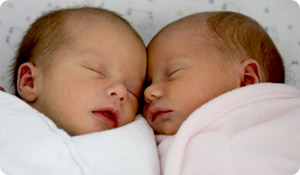
Even under the best of circumstances, giving birth and caring for a newborn baby isn't easy. New mothers are dealing with the constant demands of an infant, including feeding, changing, stimulating, and settling. Breastfeeding requires a woman to be available at least every few hours around the clock, leaving her little time for unbroken sleep. Add to that the sudden drop in hormones that occurs after childbirth and you've got a basic recipe for depression. And while postpartum depression doesn't happen to all new mothers, it certainly is fairly common: Statistics show that up to 15 percent of women report moderate to severe depression after their babies are born.
But for mothers of multiples, the numbers—and the problems—can be even bigger.
Researchers at Johns Hopkins looked at data from the Early Childhood Longitudinal Study-Birth Cohort, a large-scale study of children born in 2001. At nine months after delivery, mothers of multiples were 43 percent more likely than mothers of singletons to report feeling depressed. More worrisome was the fact that only 27 percent of new mothers of either singletons or multiples had sought counseling or medical help.
It's no surprise that women who give birth to twins, triplets or more children feel more depressed than moms who deliver just one infant. But the risks of untreated postpartum depression are real. Not only can the depression last for months or years, but women who suffer from it are at risk of harming their babies or themselves. They may begin to abuse alcohol or other substances. They may neglect their diet, even while breastfeeding. And since they're likely to feel exhausted all the time, their ability to care for their children is compromised. Depressed mothers may not play with, read to, touch, hold or try to bond with their children as much as mothers who aren't depressed do.
The best ways to treat postpartum depression are with talk therapy and antidepressants. Since antidepressants may get into breast milk, it's important for a new mother to discuss with her doctor how she's feeding her child and whether it's safe for her to continue breastfeeding. New mothers of multiples should also seek out and accept help from others so as to lighten their load. Perhaps a friend can take the babies for a walk for an hour so the mom can nap. Or grandma can offer to pay for a housekeeper once a week. Once the stress of caring for more than one newborn lifts, often the depression does as well.
Sources: Johns Hopkins Bloomberg School of Public Health, www.jhsph.edu, Pediatrics, 123:4, April 2009, pp. 1147-1154.





